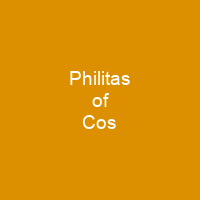Who Was Philitas of Cos?
Imagine a world where words were not just spoken but meticulously studied and cherished like precious jewels. This was the realm of Philitas of Cos, a scholar-poet who lived during the early Hellenistic period. Born around 340 BC in the island city of Cos, Philitas would go on to become one of the most influential figures in Greek literature and scholarship.
The Founder of Hellenistic Poetry
Philitas is often referred to as the founder of the Hellenistic school of poetry. This means he was not just a poet but also a grammarian who delved deeply into the meanings of words, making him one of the first scholars to combine these two roles. His work, Disorderly Words, aimed at explaining rare literary terms and their usage—essentially a lexicon for the ancient world.
The Man Behind the Poet
Was Philitas just another poet, or was he something more? He was both. Born in 340 BC, by around 309/8 BC, he had already established a reputation in his hometown of Cos. His move to Alexandria around 297/6 BC marked the beginning of a new chapter in his life, where he tutored Ptolemy II Philadelphus and Theocritus.
Life and Legacy
Philitas was known for his thin and frail body, which some say may have been due to a wasting disease. His student Hermesianax wrote about Philitas’ love poetry with Bittis, suggesting that he had a deep passion for words and their meanings. Aelian’s story of Philitas putting lead weights in the soles of his shoes to avoid being blown away by a stiff wind paints a vivid picture of someone who was deeply committed to his work.
His Works
What did Philitas write, and why does it matter? His most famous work is Demeter, an elegiac poem that narrates the hunt for Persephone by Demeter. He also wrote an epyllion called Hermes, which tells of Odysseus’ visit to the island of Aeolus, and two shorter collections titled Playthings. While only a few verses survive today, his influence on later poets like Callimachus and Apollonius of Rhodes is undeniable.
The Lasting Impact
Philitas was not just a poet; he was also a scholar who studied false arguments and erroneous word-usage. His epitaph reads: ‘Studied the Megarian school of philosophy, which cultivated and studied paradoxes…’ This suggests that his work extended beyond poetry into philosophical inquiry.
The Legacy of Philitas
Philitas was the first Hellenistic writer to combine poetry and criticism. His reputation endured for at least a century, with Strato making jokes about him and Aristarchus criticizing his vocabulary over a century later. His work was acknowledged as classic by Theocritus and Callimachus, and fragments of his writings have been edited by Spanoudakis and others.
Despite the loss of most of his works, Philitas remains an important figure in the early years of Hellenistic civilization. His influence can be seen in the work of later poets like Ovid and Quintilian. Even today, scholars continue to study his contributions to literature and scholarship.

Philitas of Cos, a man who lived in a world where words were precious and studied meticulously, left behind a legacy that continues to inspire scholars and poets alike. His work may be lost, but his influence endures, reminding us of the importance of language and its study.
You want to know more about Philitas of Cos?
This page is based on the article Philitas of Cos published in Wikipedia (retrieved on December 3, 2024) and was automatically summarized using artificial intelligence.







